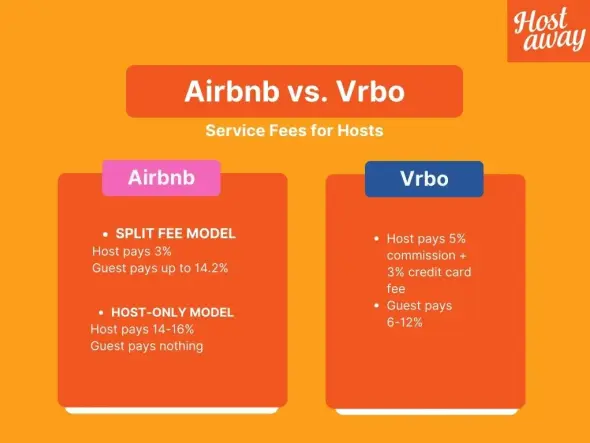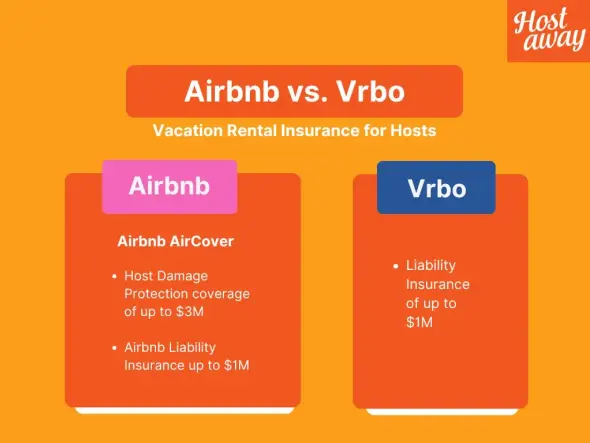Airbnb vs Vrbo: Key Hosting Differences

Airbnb and Vrbo are among the top short-term rental booking platforms to list your vacation rental on, but which reigns supreme? What are the key differences between these OTAs that make hosting on each a different experience?
Each vacation rental platform has a variety of characteristics that make them a unique albeit similar sales channel.
In this article, we’ll look at the positioning of each OTA in the short-term rental industry, the key differences in hosting on each platform focusing on aspects such as audience, co-hosting capabilities, service fees, etc and which one you should pick for your property.
Vrbo vs. Airbnb for Hosts & Guests: Short-Term Rental Industry Overview
What is Vrbo?
Vrbo (Vacation Rentals by Owner) was founded in 1995 and is a pioneer of the online short-term rental market.
Initially focused on helping homeowners rent out vacation properties, Vrbo set the stage for the modern short-term rental industry by offering a platform dedicated solely to full-property vacation rentals.
Over the years, it grew and became part of HomeAway in 2006, which was subsequently acquired by the Expedia Group in 2015. This integration expanded Vrbo’s reach by leveraging Expedia’s extensive travel network, allowing it to promote listings across multiple platforms, including Expedia and KAYAK.
What is Airbnb?
Airbnb entered the market later, in 2008, starting as a platform to rent out air mattresses and shared spaces.
The concept of offering local and unique experiences set Airbnb apart from competitors and appealed to a new generation of travelers seeking more personalized stays.
Over time, Airbnb evolved to accommodate a range of property types, from shared spaces and private rooms to entire homes and luxury accommodations. This flexibility allowed Airbnb to quickly scale globally, becoming a dominant force in the short-term rental industry.
What is their current position?
Today, both Airbnb and Vrbo are recognized as leaders in the short-term rental industry, but they serve slightly different markets.
Airbnb's innovative approach and focus on user experience have secured its position as a market leader, boasting approximately 7.7 million active listings worldwide as of 2024. This expansive reach has contributed to Airbnb holding a significant share of the short-term rental market.
Vrbo, under the Expedia Group, maintains a strong presence, especially in North American vacation markets. With over 2 million listings, it may not match Airbnb's overall market share, but Vrbo has carved out a large niche.
https://www.youtube.com/watch?v=pzvZRbNbD4I&t
10 Key Differences between Hosting on Airbnb vs. Vrbo
When deciding where to list your vacation rental, understanding the distinctions between Airbnb and Vrbo is crucial.
Here are main differences between hosting on these two leading platforms to help you choose the best fit for your property and goals.
1. Airbnb vs. Vrbo: Vacation rental property and audience profile
Both Airbnb and Vrbo allow you to list entire properties, from homes and condos to castles and luxury estates. This creates a sense that the travelers on these sites are the same, which in many cases is true, but is also not.
Airbnb offers a greater variety of accommodation types including hotel rooms, RVs, tent cabins and shared accommodations like rooms and hostels.
Airbnb caters to guests looking for a local experience. Together with its Experiences platform, hosts can offer a wide range of experiences, from cooking classes to city tours. This compliments their offerings of shared spaces including Airbnb Rooms, that further capture the experience traveler plus the more budget conscious.
In addition to experience-focused travelers, Airbnb has been very successful in urban markets and in developing their business traveler market.
Vrbo prioritizes families and is more often used by an older, more affluent guest, vacationing in large groups. Vrbo also has more stringent restrictions on what is listed on their site such as not permitting shared spaces. (Shared spaces are where guests may share common areas inside the property with the host or other guests.)
Unlike Airbnb which hosts many urban listings, most Vrbo listings are found in vacation markets.
2. Airbnb vs. Vrbo: Service fee for hosts
Service fees are an important consideration when choosing between platforms.
It's free to list as many properties as you like on both Airbnb and Vrbo and platform service fees are calculated based on the total rental amount (including fees for cleaning, pets, additional guests, etc but excluding taxes).
Airbnb charges hosts a commission of 3% per booking though it can be higher in certain countries such as Italy and for properties with Super Strict cancellation policies. Guests pay a service fee of up to 14.2%.
Airbnb also offers a host-only fee model where the entire service fee is deducted from you and no service fee is paid by guests. The host-only fee typically ranges from 14-16%.
Vrbo fees constitute a per booking option where you pay 5% commission per booking and 3% credit card processing fee. No processing fee is charged for properties in Australia, New Zealand, and Japan.
Vrbo guests pay 6-12% in service fees. The higher the reservation amount, the lower the percentage of the service fee.
3. Airbnb vs. Vrbo: Guest interface
Airbnb and Vrbo offer similar, user-friendly interfaces for travelers.
Guests can filter their search with destination, dates, property types, Instant Book, amenities, accessibility and other features, host type, etc.
Airbnb also has 60 Categories that guests can choose from, such as cabins, farms, skiing, national parks, caves, etc. Guests can also split their stays, allowing them to easily book multiple properties in different destinations in one booking to fit their travel itinerary.
Airbnb also introduced Guest Favorites, a collection of over 2 million Airbnb properties curated based on super high ratings and reviews and super low cancellation rates. It also more recently introduced a trophy-iconed badge for the top 1% of ranked listings.
(Learn more about which is better Airbnb or Vrbo for guests)

4. Airbnb vs. Vrbo: Cancellation policy for hosts
The cancellation policy you chose impacts your business. While more lenient options make bookings more attractive, it also means you lose out on revenue if you can’t find a new booking when a guest cancels at the last minute without penalty.
Airbnb offers a wide range of cancellation policies to choose from. Super Strict 60 Days and Super Strict 30 days will see you paid 50% of the reservation amount even if the guest cancels within the stipulated time period. Strict, Moderate and Flexible allows free cancellations or a 50% payment depending on when the guest cancels. There is also a Non-refundable option.
For long term stays, Airbnb hosts can choose from Strict Long term and Flexible Long Term cancellation policies.
Vrbo also offers a wide choice including a No Refund policy and a 60-day policy where hosts receive full payment for cancellations less than 60 days before reservation.
It has 60/30, 30/14, and 14/7 days policies where hosts receive a 50% refund based on how many days before the reservation the guest cancels. It also permits custom cancellation policies.
5. Airbnb vs. Vrbo: Host payments
On Airbnb you can choose from bank transfers, Paypal, Fast Pay, Payoneer Prepaid Debit Mastercard, International Wire, Western Union and MLC Card to receive payments.
Payments are sent 24 hours after the guest checks in. For longer stays (over 27 nights), Airbnb sends earnings in monthly installments, starting 24 hours from when the guest arrives.
On Vrbo you are paid through its secure platform via Visa, Mastercard or American Express processing. Alternatively, professional hosts can choose to make credit card charges, via processors such as Stripe or Braintree, securely using an integrated vacation rental channel manager.
6. Airbnb vs. Vrbo: Guest reviews
Getting great reviews is critically important, allowing your listings to rank higher and making them more attractive to guests.
On Airbnb, hosts and guests have 14 days after checking out to write their review and they are published only after both parties have submitted theirs or once the 14 days have passed.
Vrbo gives you and your guests up to one year from the date of a stay to leave a review. However, once a review has been shared, the other party has up to 14 days to submit their review in return.
Both Airbnb and Vrbo feature an overall satisfaction rating, but Airbnb breaks the score down into individual aspects such as overall experience, cleanliness, accuracy, check-in, communication, location, amenities and value.
Airbnb also awards hosts who have maintained their accounts in good standing Superhost status which can help increase bookings and revenue. Vrbo has their own superior hosting status called Premier Host.
Both Airbnb and Vrbo allow removal of guest reviews that violate their content guidelines or are based on extortion for refunds.
7. Airbnb vs. Vrbo: Long-term stays
Airbnb and Vrbo both allow for long-term rentals.
Airbnb defines a long-term rental or monthly stay as a booking for a minimum of 28 days. Rates are generally discounted compared to short-term bookings and hosts are paid monthly, starting from 24 hours after guests first check-in.
Airbnb also offers different cancellation policies for long-term stays. Hosts can choose from between Strict Long-Term and Firm Long-Term policies.
With the Strict Long-Term policy, Airbnb hosts receive a full refund if a guest cancels a monthly stay after 48 hours has passed from the time of booking as long as it is at least 28 days before the scheduled check-in. In the case of the Firm Long-Term policy, Airbnb hosts receive a full refund if a guest cancels 30 or less days before the scheduled check-in.
Airbnb is actively looking to grow its long-term rental market share, cutting into the medium-term rental and subletting market. Vrbo, on the other hand, does not prioritize long-term rentals as prominently as Airbnb but does offer extended stay monthly holiday rentals for stays at least a month longer.

8. Airbnb vs. Vrbo: Vacation rental insurance for hosts
Scruffs and scratches are part and parcel of renting out properties but when guests cause extensive damage it can be quite expensive to fix. And Airbnb and Vrbo offer host protection programs.
Airbnb AirCover comprises Host Damage Protection and Host Liability Insurance programs. Airbnb Host Damage Protection provides coverage of up to $3M for damages caused by guests and their pets.
Airbnb Liability Insurance covers the legal responsibility of hosts and their vacation rental team members when a guest is injured or has their belongings stolen or damaged. The coverage extends up to $1M.
Vrbo provides a Liability Insurance program of up to $1M for vacation rental owners and property managers. The program covers injury and property damage claims made by guests against hosts.
Hosts can also request a security deposit from guests on both platforms. On Airbnb only property managers who use a channel manager like Hostaway can do so.
You can also include House Rules in your listing to let guests know the rules on maximum occupancy, smoking, pets, etc. And ask guests to sign a short-term rental agreement that includes a liability clause, though this can only be imposed through a court and not the platforms.
9. Airbnb vs. Vrbo: Pricing for Vacation Rentals
Hosts can set their own prices on Airbnb and Vrbo. They can also integrate a dynamic pricing tool to automatically set prices for their listings.
Airbnb offers hosts the option of Smart Pricing which automatically adjusts the nightly rate in response to demand, increasing or decreasing your rates by day of the week, seasonality and local events to help attract more guests.
Vrbo provides MarketMaker, a pricing comparison tool that also sends alerts on pricing opportunities. Vrbo also automatically advertises your property on all its affiliated sites such as Expedia and KAYAK, increasing your property’s exposure.
10. Airbnb vs. Vrbo: Additional experiences
Airbnb introduced Airbnb Experiences in 2016, allowing hosts to offer activities such as cooking classes, guided tours, workshops, etc in addition to accommodation.
Airbnb Experiences enables travelers to engage deeply with local cultures and communities, enhancing their overall stay. By integrating these activities into their platform, Airbnb provides a comprehensive travel experience that goes beyond lodging.
In contrast, Vrbo focuses exclusively on property rentals and does not offer an equivalent to Airbnb Experiences. Vrbo's platform is dedicated to connecting travelers with vacation homes, emphasizing accommodations without incorporating additional activities or experiences.
For hosts interested in providing their guests with immersive local activities alongside their stay and earning extra revenue, Airbnb is the only platform out of the two that supports both accommodations and curated experiences.
The Final Verdict: Do both
Both Airbnb and Vrbo have established themselves as leaders in the short-term rental industry, each with its own strengths.
Airbnb offers a diverse user base and space for unique accommodations while Vrbo excels in catering to families and larger groups based on a more traditional vacation rental concept. Understanding these distinctions is important for property managers to better market their short-term rentals.
Despite their differences however the best option for most vacation rental homes is to choose Airbnb and Vrbo. This will help maximize the property’s exposure to travelers and bring in more bookings.
With an all-in-one vacation rental channel manager like Hostaway, you can easily list on Airbnb, Vrbo and multiple other short-term rental platforms without worrying about double bookings. You can also streamline your vacation rental operations, automate guest communication, pricing and more, and grow your vacation rental businesses. To find out more, schedule a free demo.